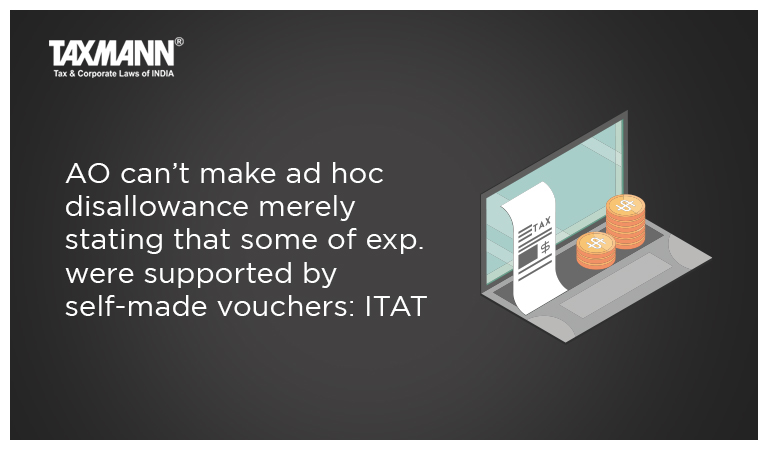AO can’t make ad hoc disallowance merely stating that some of exp. were supported by self-made vouchers: ITAT
- Blog|News|Income Tax|
- 2 Min Read
- By Taxmann
- |
- Last Updated on 6 July, 2022

Case Details: Kailas Chand Agrawal v. DCIT - [2022] 139 taxmann.com 462 (Raipur - Trib.)
Judiciary and Counsel Details
-
- Ravish Sood, Judicial Member and Jamlappa D Battull, Accountant Member
- G.S. Agrawal for the Appellant.
- G.N. Singh for the Respondent.
Facts of the Case
Assessee was an individual and proprietor of two concerns. For AY 2010-2011, a return of income was e-filed declaring a total income of Rs. 17,20,230. Return was summarily processed and subsequently selected for scrutiny through CASS.
The Assessing Officer (AO) disallowed a portion of expenditure by applying ad hoc percentile on the ground that some of the expenditures were in cash and were supported only by self-made vouchers.
The assessee filed an appeal before the CIT(A) against the order passed by AO. CIT(A) confirmed the action of AO. Aggrieved-assessee filed the instant appeal before the Tribunal.
ITAT Held
The Tribunal held that neither of the lower tax authorities had pointed out that any part of the expenditure in question was either found to be bogus or fictitious nor was found to have not been incurred by the assessee wholly and exclusively for business.
There was no mention of rationale in arriving at the percentile of disallowance in the instant case. Further, there was no provision in the present Income Tax Statute nor it has been brought to our notice by either parties to dispute, which provide for ad-hoc disallowances.
There had been no clear findings as to the number of vouchers requiring denial of allowances with the amount of expenditure and nature of defects therein or therewith. Moreover, the department could not bring out any deprecative material on record to substantiate its conclusion as logical. Consequently, ad hoc disallowance in its entirety deserved to be vacated.
Case Review
-
- V.C. Arunai Vadivelan v. Asstt. CIT [2021] 128 taxmann.com 195/282 Taxman 90 (Mad.) (para 7.5) followed.
List of Cases Referred to
-
- CIT v. Ansel Land Mark Township [2015] 61 taxmann.com 45/234 Taxman 825/377 ITR 635 (Delhi) (para 6.6)
- Hindustan Coca Cola Beverage (P.) Ltd. v. CIT [2007] 163 Taxman 355/293 ITR 226 (SC) (para 6.6)
- V.C. Arunai Vadivelan v. Asstt. CIT [2021] 128 taxmann.com 195/282 Taxman 90 (Mad.) (para 7.5).
Disclaimer: The content/information published on the website is only for general information of the user and shall not be construed as legal advice. While the Taxmann has exercised reasonable efforts to ensure the veracity of information/content published, Taxmann shall be under no liability in any manner whatsoever for incorrect information, if any.

Taxmann Publications has a dedicated in-house Research & Editorial Team. This team consists of a team of Chartered Accountants, Company Secretaries, and Lawyers. This team works under the guidance and supervision of editor-in-chief Mr Rakesh Bhargava.
The Research and Editorial Team is responsible for developing reliable and accurate content for the readers. The team follows the six-sigma approach to achieve the benchmark of zero error in its publications and research platforms. The team ensures that the following publication guidelines are thoroughly followed while developing the content:
- The statutory material is obtained only from the authorized and reliable sources
- All the latest developments in the judicial and legislative fields are covered
- Prepare the analytical write-ups on current, controversial, and important issues to help the readers to understand the concept and its implications
- Every content published by Taxmann is complete, accurate and lucid
- All evidence-based statements are supported with proper reference to Section, Circular No., Notification No. or citations
- The golden rules of grammar, style and consistency are thoroughly followed
- Font and size that’s easy to read and remain consistent across all imprint and digital publications are applied



 CA | CS | CMA
CA | CS | CMA
